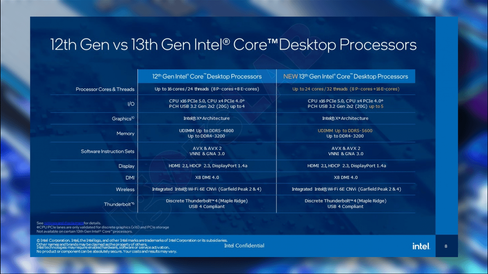Intel 13700K is just so much better!
- A2K
- Nov 16, 2022
- 5 min read
Updated: Aug 28, 2023
I spent countless hours testing this 13700K chip to find out why Intel is better and I got it! It is faster in almost every way, but by how much is where it matters. Let’s get into it.
Before we dive into the benchmarks, let's quickly talk about the latest Intel 13th Gen and what has changed. In our example we have the i7 13700K, the high-end chip that used to be more gaming focused, but now after testing I am not so sure. Price wise it looks like it will be around 400 dollar mark which is Ryzen 5 7700x region.
As compared to last generation there are a few significant changes starting with core counts. While we retain 8 performance cores with multithreading, we double the efficiency cores from 4 to 8.
Intel has also managed to push boost frequency up by 400 Mhz on both P and E cores which in turn increased maximum turbo power to 253W. The other change is faster memory controller as well as higher speed iGPU. In other words, on paper it almost seems like Intel overclocked the last gen 12900K as the rest looks very similar.
It is not all positive though. Since Intel killed off Optane business, they also don’t have any support for it on this new chip. While this may be a very niche use case, it is still important to note.
With differences out of the way - let’s cover two main similarities, and they are very very sweet. First is compatibility with existing Z690 motherboards so if you own one and want to upgrade the CPU, just flash new bios and you are good to go or if you are trying to build on a budget - pick up used one and you will likely save a few bucks.
The other thing which is also relevant to saving a few bucks - 13th gen chips still support DDR4 which is still considerably cheaper than DDR5. Yes, the new RAM is faster and is dropping in price, but you can’t beat price to performance with DDR4 yet. This is where I feel Intel is currently a little bit more competitive as an option, at least on paper.
With this out of the way let’s get into the benchmarks. For our test benches we are using last gen 12900K as well as last and current gen AMD chips for comparison.
Let’s start with gaming with the first game being Horizon Zero Dawn, where the new Intel i7 is taking a lead from the last gen i9 by 7% on the average FPS and 9% on the 1 percentiles. This Intel CPU is also leading by 9% average FPS and 16% on the 1 percentiles over 7700X which is priced very closely.
Next game is Shadow of the Tomb Raider where 13700K is leading over 12900K but is outmatched by both new Ryzen chips. The difference in average FPS to the 7700X is only 3% though and Intel chip has 3% higher 1 percentiles so I would probably call this even.
In Fortnite we yet again see 13700K is better than 12900K and losing out to the 8 core 7700X. We only see a difference of 4% on average FPS but the difference is still there.
Last game on this list is Overwatch, the original one, and just like we covered in the Ryzen review - this game has a 400 FPS limit so when we increase graphics settings we get bottlenecked on the GPU. If we keep it like this, we get to the game FPS limiter so results here are not conclusive, but with these limitations we actually see both Intel CPUs perform very close and 13700K is actually 10% more power efficient as shown in FPS per 10 Watts.
This will be very relevant shortly when we jump into the productivity workloads, but before that for those who are interested in integrated GPU performance here is Overwatch with approximately 3% improvement over 12900K and actually somewhat playable frame rates.
And in Fortnite on iGPU we see small improvements over 12900K, but still really far behind AMDs offering.
Now let’s jump to productivity, starting with the Blender benchmark where 13700K is second best on every test and it scores 9% or higher than 12900K.
In V-ray we see the same thing - the new Intel chip is 13% faster than its predecessor and is beating out last generation productivity beast from AMD the 5950X by 4%.
Next we have Blender Scandals demo rendering. Starting with results - 13700K is about 6.5% faster than 12900k and 5.5% faster than Ryzen 5950X. Those extra efficiency cores are clearly doing their job.
When we look at thermals - just like last generation, we still hit 100C and start thermal throttling, so the dual tower we have here is simply not enough to tame this CPU and we are leaving more performance on the table.
This is clearly visible in the frequency graph - the 13700K starts at 5.1 GHz and then slowly reduces down to 4.8 GHz. Thing to note here - 12900K is running slower at just over 4.6 GHz throughout the whole test.
Now this is where it gets interesting - even though the new CPU on paper has higher TDP, due to our thermal limitations it does not boost all the way and actually delivers much more power efficient results. The difference at the highest point is 40W which is over 17% lower than 12900K and if you remember from the first graph, it completes the test 6.5% quicker. So by having extra E cores and architectural optimisations it is more efficient and faster.
This leads us well to the conclusion and I want to start with some considerations - both 12th and 13th gen Intel CPUs run hot and fast for the limited cores that they possess when compared to AMD. Now this i7 model clearly outperforms the previous top of the line 12900K. For gaming, cooling is not as critical as it is for the extended productivity workloads so getting a dual tower cooler like this will get you plenty of performance.
As I mentioned earlier - 13th gen can be used on the older Z690 motherboards or even B660 if you forgo overclocking, and with cheaper DDR4 memory you could build something much cheaper than what Ryzen 7000 series is currently offering. There would be some performance sacrifices though, but the option is there.
Overall I was very sceptical of this launch but I am pleased with 13700K performance in both gaming and productivity. It could be used in a great hybrid build without the need for the highest end CPU which I am sure will have plenty of interest. Let us know what you think about this.
________________________________________________
Affiliate disclosure: as an Amazon Associate, we may earn commissions from qualifying purchases from Amazon.














































Kommentare